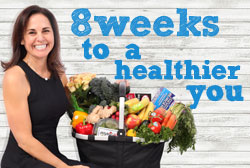Change your oils and you will change the lives of you and your family. Not all oils and fats are created equal. Heavily processed, hydrogenated, “trans” fats and oils that are in packaged foods can be extremely damaging to the body. Many people, adults as well as children, have an imbalance of Omega 6s and Omega 3s This imbalance is relatively easy to correct. It just takes planning, preparation, education and learning to read labels. When you feed your family more seafood and “fresh real food” with fewer packaged foods and eliminate processed foods, this “real-food diet” will naturally contain the right balance of Omegas. Keep in mind that fats and oils that come from whole foods and other high-quality sources can help steady your metabolism, keep hormone levels even, nourish your brain, heart, skin, hair and nails. A healthy percentage of high-quality fat in a meal satisfies us and leaves us energized, feeling fulfilled and warm. These healthy oils also provide lubrication to keep the body supple, flexible, and functioning fluidly. Dr. Sears, in his new book NDD, Nutrition Deficit Disorder, has noted that both parents and teachers have seen dramatic changes in poor behavior of children and kids focusing better in school with these positive dietary changes.
There are underlying clues and signs to look for that scream out that an oil change is necessary. An excess of heavily processed fats and oils in the diet equate to a myriad of symptoms. If you or your child experience poor work or school performance, impulsive or aggressive behavior, mood swings, weight gain, arthritis, dermatitis, colitis, allergies, asthma or skin breakouts, an oil change and diet overhaul is needed. Signs of insufficient high-quality fats may also include brittle hair and nails, dry skin, hunger after meals, and feeling cold. The biggest pitfall is a diet containing mostly packaged and fast foods or, as we like to refer to these as, “food like substances.” The best “prescription” for better health and longevity is to make long lasting changes for you and your family. Simply begin by crowding out packaged and processed foods. Add in avocado, salmon, and olive oil. You do not have to begin with massive changes all at once. Making small, steady, incremental changes will add up big in the long run. However, if you are at the readiness stage and desire more powerful health changes, commit to a detox program. It will allow you to reach your goals much sooner. If you are not ready to commit to a highly structured program, take it slower and wean yourself off of the processed foods in your diet. Continually add more fresh vegetables, fruits, a limited quantity of raw nuts and the right oils. Shop only the periphery of your grocery, as that is where the freshest food is located.
Include the following in your diet: seafood, fish oil supplements, olive oil, avocado oil, ground flax seed, coconut and coconut oil, and plenty of fresh avocado, Avoid the following: animal fat, bakery goods, french fries, fried foods, corn oil, canola oil, cottonseed oil, safflower oil, soybean oil, sunflower oil and partially hydrogenated oils (the worst of all). These oils are high in Omega 6s and are pro-inflammatory. Please consider this concept: inflammation in your gut equates to inflammation in the brain and body. (As a side note, wheat and dairy are also pro-inflammatory and when consumption is reduced or preferably eliminated, it will help heal symptoms previously listed).
There are many sources of healthy fats and oils for sautéing and baking. Try ghee (clarified butter) or coconut oil because they do not break down when used at high temperatures. When sautéing foods at moderate temperatures, try organic extra virgin olive oil. Oils like flaxseed, sesame, toasted sesame, walnut and pumpkin seed are best used unheated in sauces or dressings and on top of salads, veggies or grains. Whole foods such as avocados, flax seeds, olives and coconuts are great sources of healthy fat, along with wild salmon and omega-3 organic eggs. Experiment with these healthy fat sources and see which work best for you and leave you satisfied. When selecting oils, buy the highest-quality organic products you can afford. Good words to look for on the label are organic, first-pressed, cold-pressed, extra-virgin, and unrefined. Words to avoid are expeller-pressed, refined, and solvent extracted.
Education, preparation and learning to read labels will help you crowd out and eventually eliminate bad fats. Consuming only the good fat sources will help you and your family to become healthier. Do not be fearful of eating a whole avocado a day. It sounds decadent, but the good fat out weighs the calorie content. Add it generously to salads and smoothies. Also, let go of the fear of eating nuts and seeds. Be mindful to limit the quantity though. Macadamia nuts, almonds, walnuts, pecans, pine nuts, etc. can be added to recipes and eaten as a snack. Also, let go of the fear surrounding butter, olive oil and other healthier oils. Although this is contrary to the ‘low fat” diet mind-set, by including these good fats in your diet, you and your family will ultimately get slimmer, feel more energized, calmer, more focused, and satisfied.
I hope that this article will propel you to make some simple, yet sustainable lifestyle changes. I would love to hear from those of you who put these concepts into practice and share in the benefits you receive. In the long run, you will be happier for making these dietary changes. Please email me at: [email protected] to share your story.



